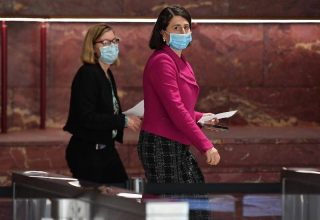
But the psychological impact of surviving the virus that has claimed the lives of those around him is taking a greater toll than the physical effects of the illness itself.
The spread of COVID-19 has been rapid. At the time of writing, there were more than 113,000 cases of coronavirus worldwide — the vast majority concentrated in China’s Hubei province — and more than 4,000 deaths globally.
But more than half of those infected — 63,000 people — have recovered so far.
A recent study from China’s Centre for Disease Control and Prevention of 44,000 confirmed cases showed that as of February 11, no child under the age of 10 had died from the coronavirus.
The experience of contracting the infection varies widely, from feeling no symptoms at all, to bouts of fever and coughing, and in more severe cases, it can lead to pneumonia and death.
Three people in Wuhan, the epicentre of the outbreak, have told the ABC what it’s like to live through the epidemic at ground zero.
‘Nothing I pursued in the past was important’
Mr Li, 32, has been hospitalised in Renmin Hospital at Wuhan University — a facility for the most severe cases — since February 6, two days after he tested positive for COVID-19.
“The coronavirus is highly contagious. Many people didn’t know the source of infection,” he said.
“The epidemic was horribly out of control, many patients in severe condition died soon after being hospitalised.”
Mr Li said the most frightening thing he witnessed was the death of a young family of four in the room just next door.
“I was terrified when I saw doctors running to perform CPR on them. I was very concerned my life would be ended like that,” he said.
“Life is fragile. Nothing I pursued in the past was important. And the only thing in my mind is keeping myself alive.”
Mr Li said he would be discharged in a week if his next two tests came back negative, and sent to a hotel with other patients for 14 days of quarantine before he is able to return home.
His wife is worried about him, and they speak on the phone every day. He is still recovering.
Recovered patient becomes volunteer
In late January, Muyang Zhou, 29, came down with a fever.
When he went to get tested, he saw four bodies in bags lying at the entrance of the hospital.
“The city government ordered to cremate the remains of any confirmed cases within three hours, but it was impossible,” he said.
Due to limited numbers of testing tools for the new coronavirus, it would be another four days before he got the results. But getting a diagnosis was, in a way, a relief.
“I was desperately anxious about it because my coughing proved my condition was the same as my cousin who tested positive earlier,” he said.
“I felt less worried when they did the test and told me the result was positive.”
Mr Zhou experienced mild symptoms — coughing and fever for about 10 days — but there were no places available in the hospital.
He was prescribed medication and sent to a hotel, where non-serious cases were being treated, and then to a mobile cabin hospital for two weeks.
His family were worried about him, putting an additional emotional burden on his recovery — but he understood their concern.
Mr Zhou said it was important to think about the mental health of residents who were watching the outbreak unfold, because a sense of fear and insecurity could climb as the numbers of confirmed cases grew.
“The Government didn’t take effective measures at the beginning of the epidemic, due to some political reasons,” he said.
Despite his early fears, Mr Zhou’s condition gradually improved.
He later became a volunteer in the hospital while he was still a patient receiving treatment — moving oxygen tanks and medical equipment, delivering food and updating patients’ test results.
He said he was now fully recovered.
Transforming the lounge room into a buffer zone
Mr Li, who asked to be known by only his surname, didn’t have access to medical facilities in Wuhan.
The 46-year-old described his condition as mild, and was able to recover while in home isolation. He tested positive in late January, three days after experiencing fever and coughing.
Mr Li said he felt relatively calm.
“I wasn’t very nervous, because I had friends and colleagues who fell sick as well,” he said.
They were able to be treated by medical professionals — since they fell ill at a time when hospitals still had capacity to attend to patients — so Mr Li asked what medications they were given and followed suit.
“What worried me most was that I might have spread the virus to others,” he said.
His wife, Ms Shen, was not so calm at the outset.
“At first, of course, we panicked, as there were so many reported cases every day and hospitals had no capacity to treat them,” she said.
But after a week, her husband’s fever receded, and so did her fears.
Her biggest worry was that her six-year-old daughter would be infected. So she isolated her from her father soon after the onset of the outbreak.
“We were sort of lucky,” she said.
“The symptoms didn’t get worse, or you could say the symptoms were mild and our lives were not at risk.
“The initial darkness enshrouding our family had so far been lifted.”
Ms Shen was prepared to send her daughter away to get cared for elsewhere if she herself became sick, but she was worried no-one would take in a child from an infected family.
With home isolation came some juggling and logistics — the lounge room was used as a buffer zone and was off-limits to everyone in the household.
She and her daughter stayed in the bedroom with Mr Li confined to the study — they communicated by phone if he needed anything, and Ms Shen washed her hands a dozen times a day.
“We hardly crossed paths. Since we only had one bathroom, it was disinfected each time after it had been used by my husband … We did everything that could possibly be done,” she said.
Virus uncertainty the root of fear
But in the early stages, the uncertainty was unbearable, Ms Shen said.
She was concerned she and her daughter might have been infected without even knowing it.
“I barely had any sleep for three nights and had bad headaches from worrying,” she said.
“Initially, people did not know much about the new virus, so that made people more scared and worried.
“I was wondering what to do if I was struck down. The thought of that made me nervous and short of breath, which made me even more nervous.”
The night the city went into lockdown was a sobering one — it made the family realise the gravity of the situation.
“That night was the longest one I’ve ever had, and I was on the verge of breaking down,” she said.
But days later, when medical teams from other major cities arrived, they felt safer.
From his hospital bed, Yibo Li told the ABC he thought it was the right decision for Wuhan and other cities to be put in lockdown to prevent the spread of the disease.
“People in Wuhan and Hubei sacrificed our freedom for other countries, and created a great amount of time for them to make preparations and avoid the coronavirus,” he said.
“I understand people from other countries may think the lockdown was extreme, but compared with life, I believe most Chinese people will choose to sacrifice their temporary freedom.”
Despite watching people die from the disease in Wuhan, he warned Australians not to panic, to be careful with hygiene measures and follow the advice of medical professionals.
“You will need to treat it rationally, and don’t be unduly alarmed,” he said.








































 The World Observer Media produces a daily online newspaper, a daily Arabic online newspaper and a monthly printed Arabic/English magazine and a weekly printed Arabic/English newspaper.
The World Observer Media’s mission is to entertain and educate all generation from the Ethnic Communities in Australia, who are interested in local, national and foreign information.
The World Observer Media produces a daily online newspaper, a daily Arabic online newspaper and a monthly printed Arabic/English magazine and a weekly printed Arabic/English newspaper.
The World Observer Media’s mission is to entertain and educate all generation from the Ethnic Communities in Australia, who are interested in local, national and foreign information. 


